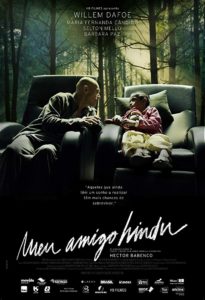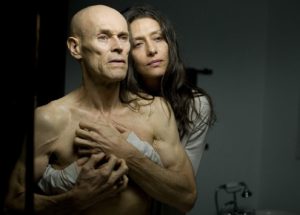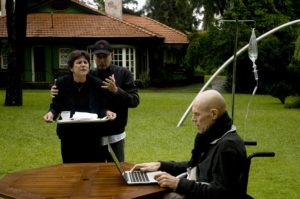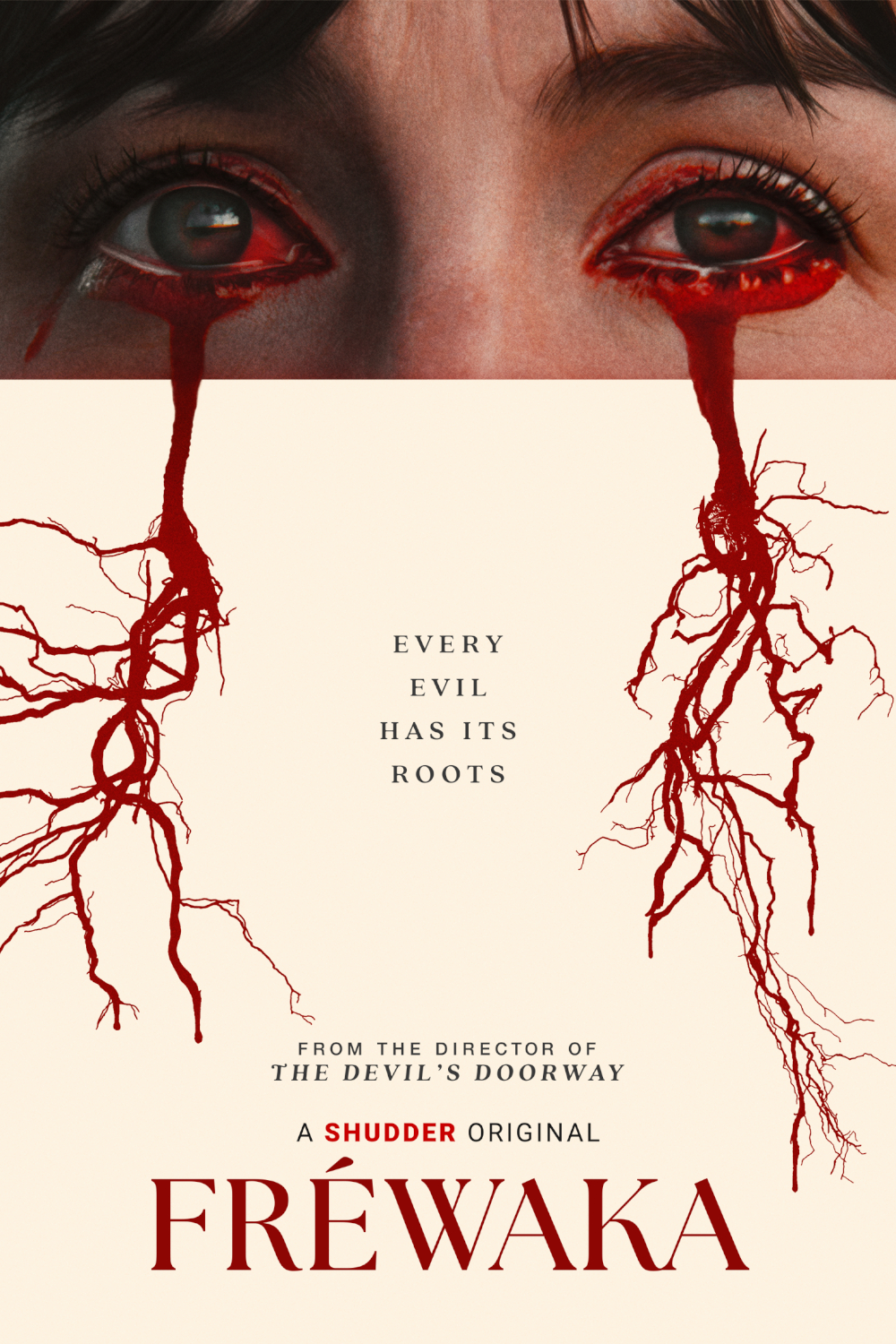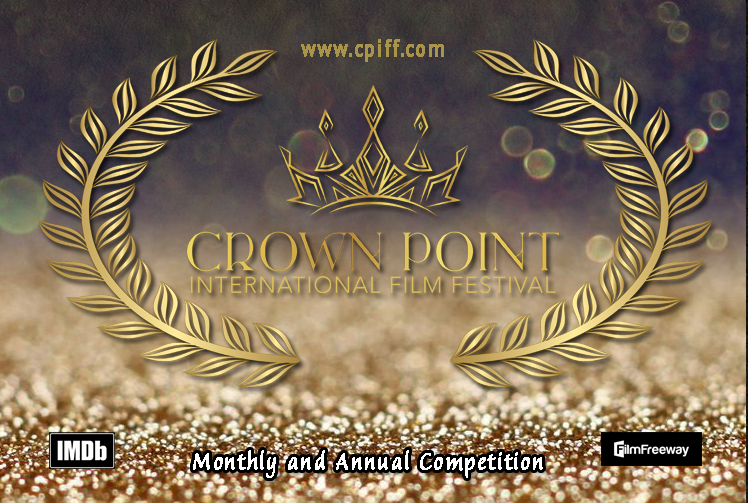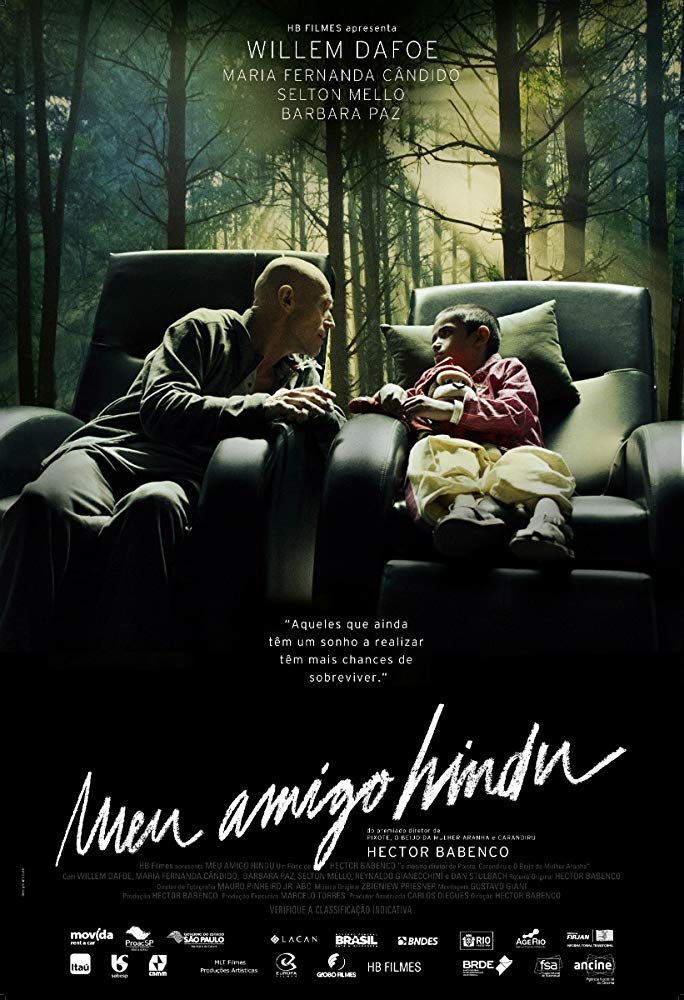
Indie Film Review “My Hindu Friend”
WATCH THE TRAILER HERE (PLEASE BE ADVISED, FOR MATURE AUDIENCES ONLY!)
First, the Recap:
The inexorable path to our end. Whether we wish to claim it or not, believe it or deny it until that last breath, death is coming. Yet, when struck with this notion, how do we choose to face it when there are as yet unfulfilled dreams waiting in the wings to be pursued and realized? Do we toss them away in a fit of giving up? Or, do we somehow circumnavigate the odds, even in spite of callous, selfish whims, and see them happen? For filmmaker Diego (Willem Dafoe), life has dealt him a cruel blow via cancer, which not only eats away at him physically, but emotionally as well, causing him to push away friends, his devoted yet neglected wife Livia (Maria Fernanda Candido), and his brother Antonio (Guilherme Weber). But, when his jaded path brings him a newfound companion, it could be the start of something Diego never saw coming and has little left of–hope.
Next, my Mind:
The final feature film from the late Argentinian writer/director/producer Hector Babenco (“Kiss Of The Spider Woman”), who passed away in July 2016 at age 70, and based on his own life story, this 124-minute drama makes its points about life, death, hopelessness, dreams, and redemption quite emphatically through a narrative that thematically explores these concepts as seen via the eyes of one man on the verge of potential death having to cope with excruciating mental, emotional, and physical pain, loss, lack of love, disassociation with everyone who’s meant something to him, and desiring to see one last cinematic vision become a reality. The story so deftly presents Diego’s journey through moments of overtly stormy experiences in every facet of his life he desperately clings to and finds fleeting meaning in, even as it all appears to be too late to reclaim any true semblance of normalcy as he battles the insidious disease ravaging him.
Yet, that’s what makes the tale so impactful in the long haul, as when making all the hurtful choices that pry him farther away from even being likable anymore, he suddenly gets renewed by a single, unexpected connection with someone who rekindles the fire to stay alive, to fight through the condition he’s in, and manage to discover a sense of revitalization to conquer his illness and come to the realization there’s still more to come that he can accomplish and enjoy contentment with. But, as indicated above, the actual road to rejuvenation is paved with embittered perspectives, harsh treatment of those around him, the heart-wrenching tedium of illness, a numbness to life, and multiple, albeit momentary encounters with his mortality, portrayed in a very unique, quirky, deeply eccentric way here. Basically, it isn’t a lighthearted chronicle. The sequences of graphic sexuality/nudity through the course of the film weren’t a preference at all for this critic, even when understanding the intent in using it to illustrate both Diego’s torment and ultimate deliverance.
What really stands out, without giving any details away, is that the inclusion of the film’s namesake doesn’t necessarily play directly into events like you might expect, yet it doesn’t detract from its importance and necessity in the narrative either. Viewing how this is utilized is the best way to fully grasp and appreciate the context of what I am conveying there. The film carries its foundational tones of despair and joy with stark bluntness thanks to the effort’s idiosyncratic visual presentation that often aims to literally (and effectively, mind you) highlight the darkest and lightest junctures in its character’s plights, embracing them so as we as viewers have the opportunity to very much feel the raw, candid intensity and passions put forth in each, leaving that lasting impression on you during and after the film. Also, the strikingly atmospheric piano score that weaves in and out of the scenes greatly defines and enhances the emotions being portrayed as well. The clever ode to “Singing In The Rain” is quite artistic and whimsical during the film’s potent finale as well.
Dafoe shall forever be the consummate character actor, and his performance as Diego carries with it the expected fire, dramatic flare, charisma, charm, and fervency as only he can deliver. Diego is a man, as mentioned above, on the brink as he plumbs the depths of absolute brokenness to all extremes in having to initially, angrily accept his possible fate in a losing fight against cancer. Yet, despite his turbulent then explosive, sedated then heartbreaking states of being he goes through, Diego becomes a new person with a new outlook on life by the film’s conclusion, and Dafoe embodies this tumultuous journey with such daring prowess and believability, a continuing ode to a stellar veteran actor. Candido smolders with affecting resolve and emotive candor in her role as Diego’s wife Livia, a woman who strives to be there for her husband in every possible way yet comes to know total isolation because of how he treats her during his illness. It’s a haunting and soul-stirring performance Candido offers and so greatly impacts the story to varying poignant and ardent degrees with beautiful execution and intentionality on the actress’ part.
Primary supporting roles abound with grace, class, and more than astute proficiency in acting talent thanks to Weber as Diego’s estranged brother Antonio with whom forgiveness, reconciliation, and a huge choice affecting Diego’s future may or may not happen, Reynaldo Gianecchini as Diego’s primary doctor Ricardo whose own outlook for his patient doesn’t always ring hopeful yet remains present nonetheless, Selton Mello as Common Man, a highly enigmatic figure who only appears to Diego during specific yet timely moments where the two share both serious and comical banter that has more meaning than first evident until it becomes clear who this visitor represents, and Barbara Paz as Sofia, an actress who connects with Diego during his renewed time of living and who becomes a definitive light in his formerly dark world. Additional but integral turns are made from Rio Adlakha, Dan Stulbach, Tania Khalill, Maite Proenca, Jason Bermingham, Daniela Galli, Sagar Karande, Michael Wade, Dalton Vigh, and many others.
In total, “My Hindu Friend” is an exercise in life’s ever-fluctuating seas and how we choose to negotiate it, learning the value of maintaining relationships that grant us hope, believing we can overcome obstacles, finding the heart to forgive others and ourselves, and very much coming to the truth that it’s ok to survive and acknowledge being alive, but even more necessary to make sure we actually live.
As always, this is all for your consideration and comment. Until next time, thank you for reading!
